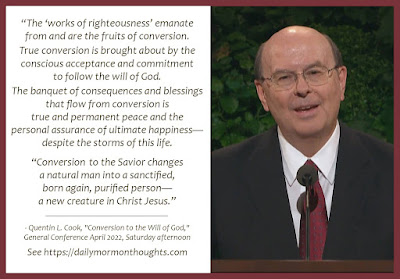"In our day, many have adopted the concept that there should be no consequence for sin. They support the unconditional condoning of sin without repentance. Our revealed doctrine not only refutes the idea that most people would be eternally condemned to hell and damnation but also establishes that personal repentance is a commanded prerequisite to partake of the Savior’s Atonement and inherit the celestial kingdom. I testify that Joseph Smith was truly an instrument in the Lord’s hands in bringing forth the Restoration of His gospel!"Because of the Restoration of the gospel of Jesus Christ, we understand the importance of both repentance and the 'works of righteousness' (D&C 59:23). We understand the overwhelming significance of the Savior’s Atonement and of His saving ordinances and covenants, including those performed in the temple."The 'works of righteousness' emanate from and are the fruits of conversion. True conversion is brought about by the conscious acceptance and commitment to follow the will of God. The banquet of consequences and blessings that flow from conversion is true and permanent peace and the personal assurance of ultimate happiness—despite the storms of this life."Conversion to the Savior changes a natural man into a sanctified, born again, purified person—a new creature in Christ Jesus."- Quentin L. Cook, "Conversion to the Will of God," General Conference April 2022, Saturday afternoonClick here to read or listen to the full discourse
So much incorrect or unclear doctrine in Christianity is clarified and corrected by the Restoration through Joseph Smith in the latter days! The interplay of grace, repentance, and obedience is a one of the most important of these.
The "works of righteousness" in our lives are a byproduct of true conversion:
As we truly commit to follow God's will, we become converted; and righteous works will follow that step. I love the description of "the banquet of consequences and blessings" - the ultimate happiness that comes only from Him, and will carry us through any storm in life.
(Compilation and commentary by David Kenison, Orem, Utah, 2022)
































